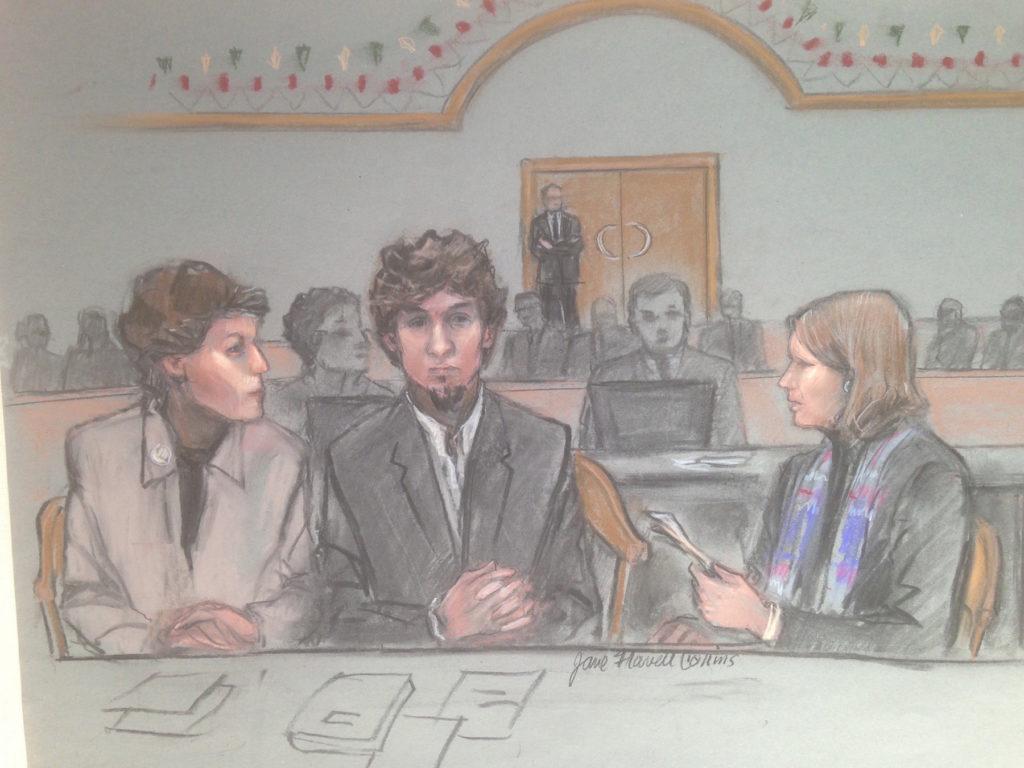By Jose Castillo, news correspondent
As of Wednesday, April 8, a set of twelve jurors found 21-year-old suspect Dzhokhar Tsarnaev guilty of 30 charges relating to the dual bombings of the 2013 Boston Marathon, and subsequent manhunt, which led to the death of three marathon spectators, Massachusetts Institute of Technology Officer Sean Collier and fellow suspect and older brother Tamerlan Tsarnaev, and the injury of nearly 280 others.
Closing arguments echoed the themes emphasized over the course of the trial. As the defense made an effort to distance Dzhokhar Tsarnaev from the actions that occurred during April of 2013, which attorneys assert to be the work of Tamerlan Tsarnaev, the prosecution presented Dzhokhar Tsarnaev as a radical terrorist with a long-standing hatred of the United States.
“He wanted to punish America for what it was doing to his people,” Prosecution Attorney Aloke Chakravarty said. “He was making a statement: an eye for an eye. You kill us, we kill you.”
The prosecution’s closing argument recalled technical evidence presented over the last month, touching lightly on the results garnered through forensic and digital investigations. However, perhaps the strongest piece of evidence came in the form of video footage depicting the chaos that occurred on Boylston Street after the first bomb went off. The prosecution showed photos of victims in its closing arguments, including 23-year-old graduate student Lu Lingzi and 8-year-old Martin Richard, whose parents were present in the courtroom.
“[Tamerlan and Dzhokhar Tsarnaev] felt they were soldiers,” Chakravarty said. “They were the mujahideen, and they were bringing their battle to Boston.”
Defense Attorney Judy Clarke, however, reminded jurors that evidence concluded Tamerlan Tsarnaev led each step of the terror attacks, and his younger brother was merely an accessory. Although she acknowledged her client’s participation in the bombings, Clarke pushed the point that Dzhokhar Tsarnaev, who at the time was a 19-year-old college student at the University of Massachusetts Dartmouth, was influenced by his older, radical brother at a time when turbulence in his family life had peaked. Referring to him by his childhood nickname, “Jahar,” Clarke pleaded to jurors to view the whole story.
“It matters because we are entitled to know the full picture,” Clarke said. “We don’t deny that Jahar fully participated in the events, but if not for Tamerlan, it would not have happened.”
Rebuttal to the defense’s closing speech was lead by Lead Prosecutor William Weinreb, who was quick to accuse the defense of undermining the suspect’s responsibility. The jurors then went into deliberation.
After a total of 11 hours of deliberation on Tuesday and Wednesday, the jurors found Dzhokhar Tsarnaev guilty of all charges presented against him, including all subsets of those charges. Decisions were unanimous in each of the 99 questions the jurors looked over. Charges included conspiracy to use a weapon of mass destruction, use and carry of a firearm during crime of violence and bombing a place of public use, all of which resulted in the deaths of Lu, Martin and 29-year-old Krystle Campbell.
These charges, including 17 that carry the death penalty, set the tone for the second part of the trial, which will focus on Dzhokhar Tsarnaev’s fate. Evidence will now be presented to the jurors on whether his actions were grave enough to evoke the use of the death penalty.
Though the jury still must refrain from speaking about the case outside the courtroom, several Northeastern students voiced their opinions on what they thought of the verdict. Most could not justify sentencing Dzhokhar Tsarnaev to death, however horrific his actions were painted by prosecutors.
“Right away, I know I wouldn’t be able to decide, since I don’t believe in the death penalty,” Will Bennett, a sophomore physics major, said.
Although the death penalty is illegal in Massachusetts, the jury presented a case in January to US Attorney General Eric Holder, Jr. to pursue the sentence federally in 17 charges. Federal prosecutors have sought the death penalty only two other times in Massachusetts. A poll conducted by The Boston Globe in September showed that 57 percent of Massachusetts respondents supported a life sentence for Tsarnaev, compared with 33 percent who favored the death penalty.
Sumedh Panchadhar, a graduate student studying engineering management, was not as quick to eschew the possibility of a death sentence.
“Right now, I am not informed on the case,” Panchadhar said. “However, if I sat in on the trial, the death penalty could be seen as justifiable.”
Megan Webb, a senior business major, disagreed. She was more concerned about the relationship between Dzhokhar Tsarnaev and the deceased Tamerlan Tsarnaev.
“While at the end of the day I do feel that if Tamerlan wasn’t there, none of this would’ve happened, I still think he is guilty,” Webb said. “I just want to sit down and talk to him and ask him if he feels bad, or if he misses his brother.”
Dzhokhar Tsarnaev faces only two options: death at the hand of the state or life in prison without the possibility of bail. Webb believes that imprisonment is the best option.
“Sitting in jail for the rest of his life, thinking about all the people he hurt, would be a lot worse than anything else we could do to him,” Webb said.
Illustration courtesy Jane F. Collins















